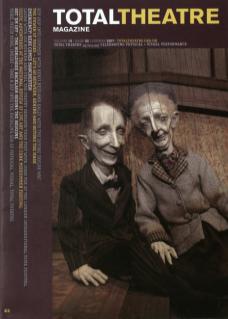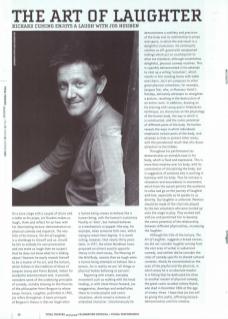On a bare stage with a couple of chairs and a table as his props, Jos Houben makes us laugh, think and reflect for an hour with his illuminating lecture-demonstration on physical comedy and slapstick. The very title of his lecture, The Art of Laughter, is a challenge to himself and us: should he fail to embody his own provocation and not make us laugh then we suspect that he does not know what he is talking about! However he easily reveals himself to be a master of his art, and the lecture, which follows in the tradition of those of Jacques Lecoq and Pierre Byland, makes for wonderful entertainment and, in parallel, considers some of the underlying principles of comedy, notably drawing on the theories of the philosopher Henri Bergson to whose essay-lecture, ‘Laughter’, published in 1900, Jos refers to throughout. A basic principle of Bergson's theory is that we laugh when a human being ceases to behave like a human being, with the human's customary fluidity or 'élan', but instead behaves in a mechanistic or puppet-like way, for example, when someone falls over, whilst trying to retain their dignity. It is worth noting, however, that nearly thirty years later, in 1927, the writer Wyndham Lewis proposed an almost exactly opposite theory in his short essay, ‘The Meaning of the Wild Body’, namely that we laugh when a human being attempts to behave like a person, for in reality ‘we are all things or physical bodies behaving as persons'.
Beginning with simple, everyday movement such as walking with the head leading, or with chest thrust forward, Jos exaggerates, develops and embellishes these to create playful and comic situations, which reveal a richness of embodied character. Simultaneously he demonstrates a subtlety and precision of the body and its relationship to props and space, in which the end result is a delightful clumsiness. He continually catches us off guard with unexpected endings which act as counterpoint to what are standard, although nonetheless delightful, physical comedy routines. This is superbly demonstrated in his attempt to chat up a willing 'volunteer', which results in him creating havoc with table and chairs. Jos' art compares to other great physical comedians, for example, Jacques Tati, who, in Monsieur Hulot's Holiday, delicately attempts to straighten a picture, resulting in the destruction of an entire room. In addition, drawing on his training with Lecoq and in Feldenkreis technique, Jos discourses on the physiology of the human body, the way in which it is constructed, and the comic potential of different parts of the body. He further reveals the ways in which individuals emphasise certain parts of the body, and attempt to hide or protect other areas, with the paradoxical result that this draws attention to the hidden.
Throughout his performance Jos demonstrates an enviable ease in his body, which is fluid and expressive. This is more than mastery over his body, with its connotation of disciplining the body, but is suggestive of someone who is working in harmony with his body. Thus he conveys a relaxation and assuredness in movement, which from the outset permits the audience to relax and go on the journey of laughter with him, especially as he speaks to us directly. Our laughter is unforced. Mention should be made of the vital role played by the two volunteers who were invited up onto the stage to play. They worked well with Jos and permitted him to develop the comic potential of the relationship between different physicalities, increasing the laughter.
Although the title of the lecture, The Art of Laughter, suggests a broad canvas, Jos did not consider laughter arising from the vast area of verbal or subversive comedy, and neither did he consider the roles of comedy specific to shared cultural contexts. Wisely he concentrated on the area of the playful and the physical, in which areas he is an absolute master. It is fitting that he dedicated his show to another master of physical comedy, the great comic acrobat Johnny Hutch, who died in December 2006 at the age of ninety-three. I hope that Jos too will be giving this joyful, affirming lecture-demonstration until his nineties.

